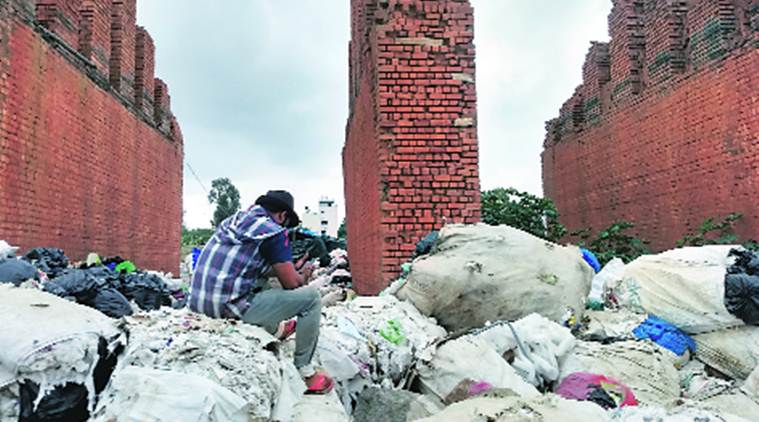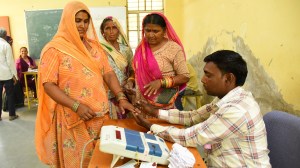- India
- International
‘If caught in Bangladesh, we have papers. But in India…’
Around 200 people were arrested on the India-Bangladesh border earlier this month, while trying to cross over from India. Reports in Bangladesh’s newspapers suggest they were fleeing “harassment” in Bengaluru.
 With many ‘Bangladeshis’ leaving, labour crunch hits Bengaluru’s waste business. (Express photo)
With many ‘Bangladeshis’ leaving, labour crunch hits Bengaluru’s waste business. (Express photo)
In a settlement of tin huts that stands in the shadow of a high-rise apartment complex in Bellandur, Bengaluru, all talk is of the difficult journey back “home”.
“This was a bustling colony. Now I look at it and I want to cry. Almost everyone has left. Those who haven’t are, like me, waiting to scrounge together some money,” said a greying man in his 40s, who asked not to be named. “We need Rs 15,000 per head to return: there is the train fare to pay, money for the trip; and there are guards to be paid off at the border,” he said. He said he has worked in the city’s waste collection and segregation business for 13 years, doing the “ganda kaam” that paid for the education of his two college-going daughters back home in Bangladesh.
“A few weeks ago, I sent most of my family away. Only one daughter remains with me. If the government does not want us here, what can we do? Better to be caught at the border than here,” he said. He said he was born in Mohonganj, Bangladesh, and came to India as a child with his parents. He lived and worked in Seemapuri, Delhi, for many years, before he moved to the Karnataka capital. According to residents, of the 200 families that lived here, only 10-20 remain. In some of the abandoned houses, local Kannadiga residents have moved in.
In many other settlements (Thuburahalli, Haralur, Sarjapur) too, the story is of a reluctant but resigned exodus, turning many of the places into “ghost towns”, said a legal aid activist. Children are being pulled out of schools, household goods and personal vehicles being sold off at throwaway prices; even as the fear of being caught on the India-Bangladesh border looms. A small minority of migrants has moved to Delhi, Tamil Nadu and other non-BJP-ruled states.
A 28-year-old man said he quit his job as a driver a month ago, soon after a raid by the Bengaluru police on October 25 that led to the detention of 60 people, including 40 women and children. “I quit out of fear. I didn’t want the police to catch me. If even one person is caught, that family is ruined,” he said.

He is now faced with the prospect of a perilous journey back to Bagerhat in Bangladesh with his 25-year-old wife and one-month-old son. “If we are caught in Bangladesh, it’s still okay. We have documents to show, and they will release us eventually. But if we are caught in India…” said his wife. She said a neighbour from the same settlement, who worked in nearby apartments as a domestic help, was caught on the border with 70 others. “Our country has little work, and too many people. Even if you work, you can’t earn. That’s why we move,” she said.
Around 200 people were arrested on the India-Bangladesh border earlier this month, while trying to cross over from India. Reports in Bangladesh’s newspapers suggest they were fleeing “harassment” in Bengaluru. An activist, who works with migrant children in Bellandur, reported that a 13-year-old student at a Marathahalli school and her family was caught on the border while trying to cross over.
The choice of leaving and belonging is not black-and-white for some. A 26-year-old man, who was born in Bengaluru, said he would wait and watch, and hope that the current crackdown dies down. “My family is from Khulna, but we came here decades ago. I studied in school here, I know Kannada too. Let’s see what happens,” he said.
In the Bellandur settlement, another man, who has worked in the waste business for 10 years in Bengaluru, joked about his complicated history and the unsure road ahead. He said his son studied in a government school in the city; his wife is an Indian, with roots in Bihar. His ancestors come from a place on the India-Bangladesh border in Tripura, he said, which is “a no-man’s land”.
“I was told I was born in Tripura. Then because of riots there, we kept moving till we came to Kolkata, and then went back to Tripura. I have documents to show I studied in school and college in Tripura. But what use are they? My wife and I got married in Kolkata. Now, I don’t know the answer myself: which country’s citizen am I,” he says.
The uncertain fate of the 60 arrested in October, who were sent to Howrah last week but who remain in detention in Bengal in the absence of any formal deportation mechanism between the countries, is an ominous cautionary tale. Over and above that, the talk of a nationwide NRC, Citizenship (Amendment) Bill and detention centres — the state government recently informed the Karnataka High Court of its plans to open 35 detention centres, one for each district — has also led many migrants to up and go.
The 40-year-old waste worker said he had seen similar raids before, but this crackdown was different. “This year, the police are telling us to leave. They say if you don’t have money, lie low and work for a few months. But leave,” he said.
In Thuburahalli’s Kali Khatta area, known to be the home of many “Bangladeshis”, a wary silence greets outsiders — except for an elderly man, dressed in a shirt and a pair of trousers, who showed us his Aadhaar card and a list which shows his name on Assam’s NRC list. “I am from Barpeta Road, Assam. You can check my papers,” he said.
Three weeks ago, when The Indian Express visited the area, people were fleeing in panic, sending women and children away. At least one of the men, who said he was Bangladeshi and would leave soon, was still waiting to leave. While he had earlier introduced himself as Suman, this time, he said his name was Moinuddin. “I told you I will leave, and I will,” he said before slinking away.
“There were Bangladeshis among us, only a few remain, but they do us no harm. They are poor people like us who have come to earn a living,” said a woman, who said she was from Assam but did not reveal her name.
For Bengaluru’s waste management businesses, the departure of the migrants has led to a crunch in workers. “I had 80 workers and 12 trucks that would collect waste from various colonies. Now, only 20 workers are left, they will leave too,” said Minhaz, a resident of Chhapra, Nadia, who runs a waste segregation operation in Haralur. Many Indians, too, he said, were running scared. “Even Indian Bengalis are leaving. When I showed the police my identity cards and land records, they asked for documents from before 1971. They said several Bangladeshis came and settled in Nadia in 1971, so these documents would not work,” he said.
Hidden away behind a massive construction site in Bellandur is a “godown”, where the waste from the city’s airport is segregated. A handful of workers — one a mother, accompanied by her three children — sit amid piles of black bags, sorting out the plastic and recyclable items from the rotting waste, with no more protection than a pair of gloves.
“A month ago, the Bangladeshi thekedar of this godown left. So, I was asked by the land owners to take over,” said Shariful, a migrant from West Bengal, whose workers now run operations here. “But with the Bangladeshis leaving, there are just no people to do this work. Will the Bengalis or the Indians do this work? No way. They just will sit and watch TV,” he said.
For many years now, the alleged “Bangladeshis” have edged out other communities from the waste business. “They ask no questions, and agree to be paid pitiable rates. But their labour has kept this city clean all this while,” said Kaleemullah, a human rights activist.
“None of us in this settlement is into unlawful acts. We work hard to live and eat, and send money back. That’s all,” said the man from Tripura.
As they prepare for the return journey, the migrants explained how they got here. “You ask why we came as illegals?” asked the 28-year-old former driver. “If we come on a passport, we get a three-month visa. What can we earn in that time? Let the Indian government give us a two-year visa, and see. We won’t sneak in then. We will come and do honest work. And if you don’t want us at all, then at least let us go in peace. Don’t send your guards on the borders after us,” he said.
Apr 23: Latest News
- 01
- 02
- 03
- 04
- 05






































